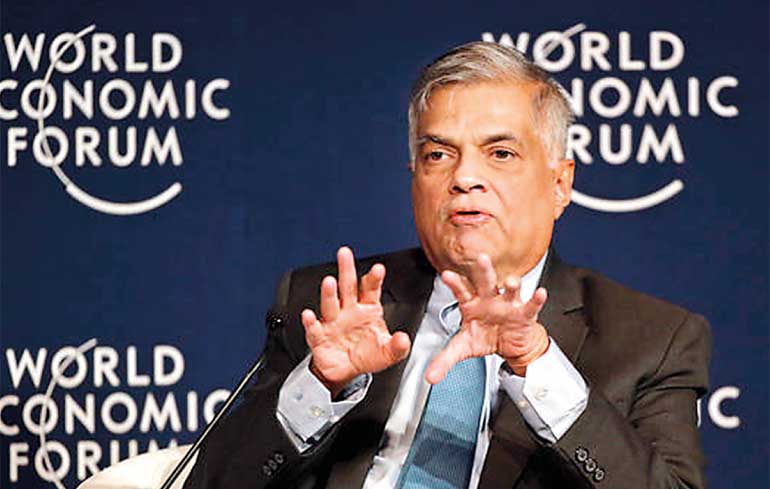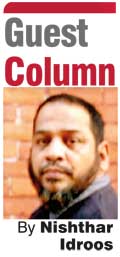Saturday Feb 14, 2026
Saturday Feb 14, 2026
Saturday, 6 February 2016 02:05 - - {{hitsCtrl.values.hits}}
Just over a year ago Sri Lanka had all but divorced herself from the rest of the world. She had tightened a seat belt and was on the fast lane cruising at 100 mph down ‘Harare Street’ – final destination – ‘Mugabeland’. The only land on the face of the earth that has a profusion of “zerophiles” – a people forced to love and adore the never-ending zeroes boldly reflected on their absolutely useless currency.
If not for the political changes that took place subsequently in Sri Lanka, its nationals too would have had the not-so-pleasant experience of personally seeing, touching and smelling crisp Rs. 10,000 bills hot from the press duly signed by Mahinda Rajapaksa as the Finance Minister and of course the inimitable and irresistible Ajith Nivard Cabral as the then Governor of the Central Bank of Sri Lanka.
 Given the international standing of Prime Minister Ranil Wickremesinghe, the reclamation and restoration process had been put on steroids
Given the international standing of Prime Minister Ranil Wickremesinghe, the reclamation and restoration process had been put on steroids
Anyone with common sense would doubtless acknowledge the stinging if not debilitating reality that could have consumed all and sundry if people had extended another mandate to perpetuate the supposedly benign and gnostically-tapered “Chintanaya” mantra. A former lawyer turned message merchant and businessman along with his coterie of eccentric ad-men and women summoned all advertising skill and courage necessary to embellish a war-winning President but failed to get him elected. There is a lesson for students of marketing here – if your core is weak, no amount of uproar will restore.
8 January 2015 came and a new President was enthroned. Just over a year Sri Lanka had once again become an integral part of civilisation. She is being welcomed all over, promises to engage and restore economic ties from nations who were once good friends continue to coalesce. It’s indeed poignant to note the number of countries we  had unintentionally ignored not being fully cognisant to ensuing ramifications. Being adequately cerebral and sagacious is a sine qua non for an astute politician.
had unintentionally ignored not being fully cognisant to ensuing ramifications. Being adequately cerebral and sagacious is a sine qua non for an astute politician.
Given the international standing of Prime Minister Ranil Wickremesinghe, the reclamation and restoration process had been put on steroids. True patriots work for the wellbeing of the people and not their families. We are not surprised that for the first time in history a Sri Lankan political leader had been invited to attend the exclusive Davos meeting. This may be anathema to Mahinda Rajapaksa and his company. Regardless they would go on their professed journey to obfuscate and discombobulate until dates for the next general election is publicly proclaimed.
Davos, a town in the Swiss Alps and a popular winter sports resort with a conference centre that hosts the annual World Economic Forum for big boys of business along with national leaders, was one busy place. The dignitaries were deliberating hard on pressing issues confronting the global economy.
Prime Minister Ranil Wickremesinghe and Government officials had the opportunity to meet several business leaders and heads of state on the sidelines. Richard Branson of the Virgin Group, Cyrus Mistry, Chairman of the Tata Group, Kevin Sneader of McKinsey and Company and Jean-Philippe Courtois, President of Microsoft International were all important personages to discuss business.
Economic growth is primarily generated through FDIs and the Prime Minister had set an excellent example of walking the talk. Prime Minister Wickremesinghe also had talks with Prime Ministers of Sweden Stefan Lofven and Turkey Ahmet Davutoglu, briefing them on the new packages for foreign direct investment in Sri Lanka.
The infrastructure-driven investment program of the previous Government at higher interest rates and low or no returns continues to be a nightmare vis-à-vis its repayment. Imagine in the next few years loans extending up to about $ 5,000 mature and having to be settled in dollars especially in the light of dwindling Government revenue. Anyone with a modicum of economics will be able to understand the net effect the above will have on Podi Mahattya, Perumal and Cader Nana. Is this the dividend of peace people were expecting?
Every government since 1977 had reiterated its will to eliminate poverty. Triumphant aspirations to this end had been gloated but to no avail. Now there is this talk of making Sri Lanka a middle income country with $ 4,000 per capita income. How can these noble intentions ever be realised when the putrefaction of corruption is so deeply entrenched and extrication looking so bleak?
The emerging sprawling skyline in Colombo or the healthy market capitalisation of the CSE means nothing to the ordinary Joe. His needs are survival pure and simple. Unarrested corruption only paves the way for issues to get worse and morbid. Yahapalanaya is a dirty word and will continue to remain dirty until people feel it, see it and taste it. Their scepticism and cynicism is perfectly legitimate.
Re-engagement with the international community must be rigorously pursued to meet annual FDI targets. Davos was a good start. The team must be galvanised in this noble pursuit to harness as much investment, create as much employment and most importantly alleviate poverty, which is the most gratifying of them all.